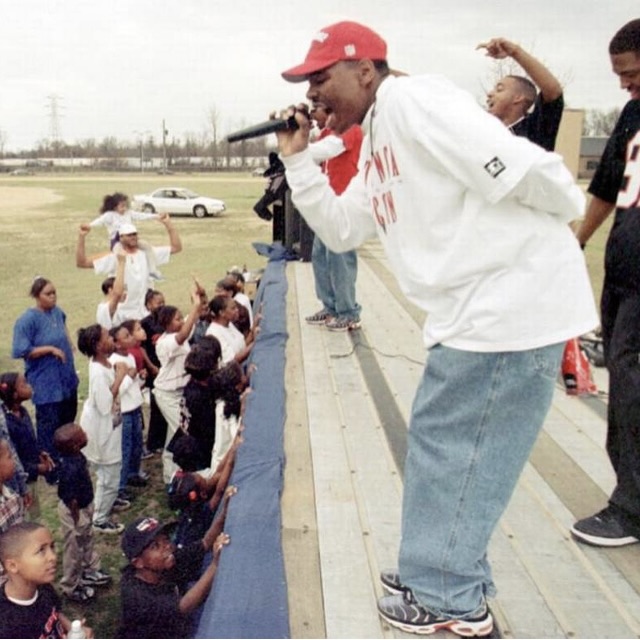Cannabis Clemency Applicants.
The Weldon Project and National Cannabis Roundtable Launch Cannabis Clemency Campaign
NCR and The Weldon Project have been working with Oklahoma Appleseed for the purpose of preparing petitions for individuals currently incarcerated because of cannabis convictions. The objective being to hand-deliver these petitions as a group to the U.S. pardon attorney to then be presented to the President for action as an entire category versus person by person. The initiative has turned around 20-plus petitions in the span of six weeks at the price of approximately $500 per individual, which is an incredibly low-cost approach toward expediting individuals currently incarcerated for marijuana convictions to be able to finally return to their homes, families, lives, and livelihoods.

Jerry Haymon IV
Total Sentence: 10 years
Time Served: 4 years
Convicted Crime: Drug distribution conspiracy.
Jerry Haymon IV is a 30-year-old Black man from Clovis, California, who received a mandatory 10-year sentence for a drug distribution conspiracy where packages of marijuana were shipped from California to Virginia. Jerry had been a football star out of Clovis High School, who went on to play defensive back in college, where he was majoring in economics (and even made the Dean’s List one semester). Prior to his arrest in 2019, Jerry was looking to try out for professional football. At sentencing, the trial judge regretfully noted that his hands were tied by federal mandatory minimum prison terms for marijuana.

Edwin Walter Rubis
Total Sentence: 480 months (40 years)
Time Served: 22 years
Convicted Crime: Conspiracy to possess marijuana and possession of marijuana with intent to distribute marijuana (12 counts).
Edwin Rubis is serving a 240-month sentence imposed in 1999 for conspiracy to possess and possession of marijuana with intent to distribute. His conviction was based on the testimony of co-defendants in a drug trafficking organization who named their past co-conspirators to reduce their own sentences. Since his conviction, the state of Texas has decriminalized medicinal use of hemp and several counties and cities therein have implemented further cannabis decriminalization policy initiatives. Edwin’s case represents important issues of excessive sentencing relating to cannabis and federalism. Despite these issues related to his conviction, Edwin has been a model prisoner for the past 22 years that he has spent serving his sentence. Edwin’s circumstances present an excellent case for the principled use of clemency.

Daniel Dario Travino
Total Sentence: 16 years
Time Served: 2 years
Convicted Crime: Conspiracy to manufacture with intent to distribute marijuana.
Daniel Travino is serving a nearly 16 year sentence imposed in 2020 for conspiracy to manufacture with intent to distribute marijuana and several other cannabis charges. Mr. Trevino owned and operated medical cannabis stores in Michigan after the state legalized medicinal cannabis in 2008 but was not in compliance with state regulations. Today, those who are not incomplice with the state regulations face fines and discipline by the regulatory board, not imprisonment. Mr. Trevino was well known in his community as a person who bridged access to healthcare. Further, due to Michigan becoming an adult-use (recreational) cannabis state, Mr. Trevino today would not be barred from owning his prior retail establishments.

Jerry Austin
Total Sentence: 200 months (16.7 years)
Time Served: 6 years
Convicted Crime: Conspiracy to possess with intent to distribute 1,000 kilograms or more of marijuana.
Jerry Austin is serving a 200-month sentence imposed in 2017 for a single count of conspiracy to possess with intent to distribute 1,000 kilograms or more of cannabis. His conviction was based on him taking responsibility for his conduct and acknowledging that he was involved with a drug trafficking organization. For the past six years, Jerry has spent much of his time reflecting on his past mistakes, missing his sons, and working towards rehabilitation. Jerry’s case represents important issues of excessive sentencing relating to cannabis and federalism. Jerry’s circumstances present an excellent case for the principled use of clemency.

Jose Ramon Valero Jr.
Total Sentence: 7 Years
Time Served: 1<
Convicted Crime: Conspiracy to distribute marijuana and possession of a firearm in furtherance of a drug crime.
Jose Valero Jr. is serving a 7 year sentence imposed in 2022 for conspiracy to distribute marijuana and possession of a firearm in furtherance of a drug crime. Mr. Valero Jr. pleaded guilty and has taken responsibility for these crimes. Between his arrest in 2020 and sentencing in 2022 the District Court judge granted Mr. Valero Jr. supervised release. During these nearly two years Mr. Valero Jr. turned his life around, holding a steady job and providing for his young children and found mentors to guide his decisions. Further, his case represents an important issue highlighting the conflictions of local ordinances, state law, and federal law. He was a nonviolent cannabis offender.

Jason Jay Norton
Total Sentence: 12 years
Time Served: 6 years
Convicted Crime: Conspiracy to distribute marijuana and conspiracy to engage in money laundering.
Jason Norton is serving a nearly 12 year sentence imposed in 2016 for conspiracy to distribute marijuana and conspiracy to engage in money laundering. Mr. Norton plead guilty and has taken responsibility for these crimes. He was a nonviolent cannabis offender. Further, his case represents an important issue connecting poverty and crime.

Parker Antron Coleman
Total Sentence: 60 years
Time Served: 12 years
Convicted Crime: Conspiracy to possess with intent to distribute marijuana; conspiracy to engage in money laundering; possession of firearm by felon; possession of firearm in furtherance of drug crime.
Parker Coleman is serving a 60 year sentence imposed in 2014 for conspiracy to possess with intent to distribute marijuana; conspiracy to engage in money laundering; possession of firearm by felon; and possession of firearm in furtherance of drug crime. Although sentenced in 2014, Mr. Coleman has been in federal custody since 2010. Mr. Coleman was subject to Sec. 924 “stacking” and harsh mandatory minimums. If he were sentenced today, due to the First Step Act and other legislative and enforcement changes, Mr. Coleman would be subject to less than half of the time he is currently serving.

Jeffrey Stuart Putney
Total Sentence: 96-months (8 years)
Time Served: 3 years
Convicted Crime: Maintaining drug-involved premises and distribution and possession with intent to distribute marijuana.
Jeffrey Putney is serving a 96-month sentence imposed in 2019 for the charges: maintaining drug-involved premises and distribution and possession with intent to distribute marijuana. After his sentence, the state of Maryland has introduced more cannabis-friendly legislation and put recreational cannabis use on the ballot. Additionally, Jeffrey’s sentence should be reduced under the First Step Act’s earned time credits. Jeffrey’s charges were both for non-violent offenses, but moreover, Jeffrey has no history of violence in his past crimes or personal life whatsoever. Jeffrey’s case represents the important issues of excessive sentencing relating to non-violent cannabis charges and federalism. Despite these issues related to his conviction, Jeffrey has been a model prisoner for the past three years he has been locked behind bars. Jeffrey’s circumstances present an excellent case for the principled use of clemency.

Daniel Buckley Muessig
Total Sentence: 60 month
Time Served: 3 months
Convicted Crime: Conspiracy to distribute marijuana.
Daniel Muessig is serving a 60 month sentence imposed in 2022 for conspiracy to traffic marijuana. His conviction was based on the operation of a marijuana business which is medically legal under Pennsylvania’s marijuana laws. This case represents important issues of federalism and federal over-reach relating to marijuana prosecutions.

James Edward Maxwell Jr.
Total Sentence: 10 years (120-months)
Time Served: 5 years
Convicted Crime: Two charges of Possession with intent to distribute marijuana.
James Maxwell Jr. is serving a 10-year (120-month) sentence imposed in 2017 for the non-violent offense possession of marijuana with intent to distribute. His conviction was based on the operation of a cannabis business that is medically legal under modern Georgia cannabis law. This case represents important issues of federalism and federal overreach relating to cannabis. Despite these issues related to his conviction, Maxwell has been a model prisoner who presents an excellent case for the principled use of clemency.
Ira Chistopher Jackson
Total Sentence: 120 months
Time Served: 63 months
Convicted Crime: Possession with intent to distribute marijuana.
Ira Jackson is serving a 120 month sentence imposed in 2017 for possession with intent to distribute marijuana. His conviction was based on the operation of a marijuana business which is medically legal under Georgia’s marijuana laws.
Charles Starks
Total Sentence: 162-month (13.5-year)
Time Served: 10 years
Convicted Crime: Possession with Intent to Distribute Marijuana and Possession of Ammunition by a Convicted Felon.
Charles Starks is a 32-year-old African-American man currently incarcerated at USP Leavenworth. He received a 162-month (13.5-year) sentence for the non-violent charges of Possession with Intent to Distribute Marijuana and Possession of Ammunition by a Convicted Felon. Mr. Starks’ conviction stems from conduct that occurred in the early 2010s when he was just 22-years-old. He has served over a decade of his sentence in a federal incarceration facility. Charles’ excessive sentence is the result of his status as a “career” criminal, who received his felon status based solely on non-violent drug charges. Charles’ case represents important issues of excessive sentencing relating to cannabis and federalism. Despite these harsh realities related to his conviction, Charles has been a model prisoner for the past 4 years he has been locked behind bars. Charles Starks circumstances present an excellent case for the principled use of clemency.
Antoine Dymetrae Turner
Total Sentence: 160 months (13.3 years)
Time Served: 4 years
Convicted Crime: Conspiracy to Distribute Less Than 50 Kilograms of Marijuana and Felon in Possession of Firearms and Ammunition.
Antoine Turner is serving a 160-month sentence imposed in 2019 for Conspiracy to Distribute Less Than 50 Kilograms of Marijuana, in violation of 21 U.S.C. §§ 841(a)(1), 841(b)(1)(D), 846, 851 and Felon in Possession of Firearms and Ammunition, in violation of 18 U.S.C. §§ 922(g)(1), 924(a)(2). Antoine’s conviction is the result of his status as a “career” criminal, who has received his felon status based only on non-violent drug charges. Since his conviction, Antoine’s son has been born, a child he has only ever met four times. Antoine’s case represents important issues of excessive sentencing relating to cannabis and federalism. Despite these harsh realities related to his conviction, Antoine has been a model prisoner for the past 4 years he has been locked behind bars. Antoine Turner’s circumstances present an excellent case for the principled use of clemency.
